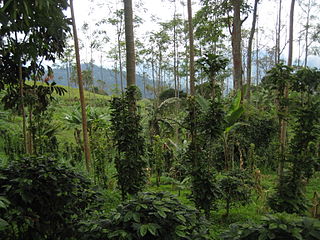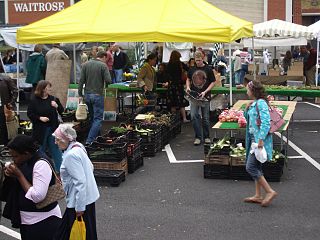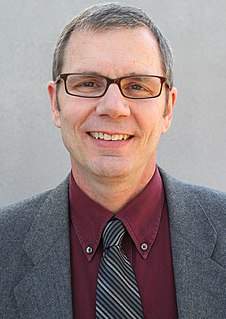
The New Partnership for Africa's Development (NEPAD) is an economic development program of the African Union. NEPAD was adopted at the 37th session of the Assembly of Heads of State and Government in July 2001 in Lusaka, Zambia. NEPAD aims to provide an overarching vision and policy framework for accelerating economic co-operation and integration among African countries.
The controversy surrounding the political status of Taiwan is a result of World War II, the second phase of the Chinese Civil War (1945–1949), and Cold War.
The International Treaty on Plant Genetic Resources for Food and Agriculture, is a comprehensive international agreement in harmony with the Convention on Biological Diversity, which aims at guaranteeing food security through the conservation, exchange and sustainable use of the world's plant genetic resources for food and agriculture (PGRFA), the fair and equitable benefit sharing arising from its use, as well as the recognition of farmers' rights. It was signed in 2001 in Madrid, and entered into force on 29 June 2004.

Agricultural policy describes a set of laws relating to domestic agriculture and imports of foreign agricultural products. Governments usually implement agricultural policies with the goal of achieving a specific outcome in the domestic agricultural product markets.

Slow Food is an organization that promotes local food and traditional cooking. It was founded by Carlo Petrini in Italy in 1986 and has since spread worldwide. Promoted as an alternative to fast food, it strives to preserve traditional and regional cuisine and encourages farming of plants, seeds, and livestock characteristic of the local ecosystem. It promotes local small businesses and sustainable foods. It also focuses on food quality, rather than quantity. It was the first established part of the broader slow movement. It speaks out against overproduction and food waste. It sees globalization as a process in which small and local farmers and food producers should be simultaneously protected from and included in the global food system.

Sustainable agriculture is farming in sustainable ways meeting society's present food and textile needs, without compromising the ability for current or future generations to meet their needs. It can be based on an understanding of ecosystem services. There are many methods to increase the sustainability of agriculture. When developing agriculture within sustainable food systems, it is important to develop flexible business process and farming practices. Agriculture has an enormous environmental footprint, playing a significant role in causing climate change, water scarcity, water pollution, land degradation, deforestation and other processes; it is simultaneously causing environmental changes and being impacted by these changes. Sustainable agriculture consists of environment friendly methods of farming that allow the production of crops or livestock without damage to human or natural systems. It involves preventing adverse effects to soil, water, biodiversity, surrounding or downstream resources—as well as to those working or living on the farm or in neighboring areas. Elements of sustainable agriculture can include permaculture, agroforestry, mixed farming, multiple cropping, and crop rotation.

Food security is the measure of the availability of food and individuals' ability to access it. According to the United Nations' Committee on World Food Security, food security is defined as meaning that all people, at all times, have physical, social, and economic access to sufficient, safe, and nutritious food that meets their food preferences and dietary needs for an active and healthy life. The availability of food irrespective of class, gender or region is another one. There is evidence of food security being a concern many thousands of years ago, with central authorities in ancient China and ancient Egypt being known to release food from storage in times of famine. At the 1974 World Food Conference, the term "food security" was defined with an emphasis on supply; food security is defined as the "availability at all times of adequate, nourishing, diverse, balanced and moderate world food supplies of basic foodstuffs to sustain a steady expansion of food consumption and to offset fluctuations in production and prices". Later definitions added demand and access issues to the definition. The first World Food Summit, held in 1996, stated that food security "exists when all people, at all times, have physical and economic access to sufficient, safe and nutritious food to meet their dietary needs and food preferences for an active and healthy life."

Local food is food that is produced within a short distance of where it is consumed, often accompanied by a social structure and supply chain different from the large-scale supermarket system.

Food First, also known as the Institute for Food and Development Policy, is a nonprofit organization based in Oakland, California, USA. Founded in 1975 by Frances Moore Lappé and Joseph Collins, it describes itself as a "people's think tank and education-for-action center".

La Vía Campesina is an international farmers organization founded in 1993 in Mons, Belgium, formed by 182 organisations in 81 countries, and describing itself as "an international movement which coordinates peasant organizations of small and middle-scale producers, agricultural workers, rural women, and indigenous communities from Asia, Africa, America, and Europe".

In the United States, the Supplemental Nutrition Assistance Program (SNAP), formerly known as the Food Stamp Program, is a federal program that provides food-purchasing assistance for low- and no-income people. It is a federal aid program, administered by the United States Department of Agriculture under the Food and Nutrition Service (FNS), though benefits are distributed by specific departments of U.S. states.

CGIAR is a global partnership that unites international organizations engaged in research about food security. CGIAR research aims to reduce rural poverty, increase food security, improve human health and nutrition, and sustainable management of natural resources. It is carried out at 15 centers that collaborate with partners from national and regional research institutes, civil society organizations, academia, development organizations, and the private sector. These research centers are around the globe, with most in the Global South and Vavilov Centers of agricultural crop genetic diversity.
Food politics is a term which encompasses not only food policy and legislation, but all aspects of the production, control, regulation, inspection, distribution and consumption of commercially grown, and even sometimes home grown, food. The commercial aspects of food production are affected by ethical, cultural, and health concerns, as well as environmental concerns about farming and agricultural practices and retailing methods. The term also encompasses biofuels, GMO crops and pesticide use, the international food market, food aid, food security and food sovereignty, obesity, labor practices and immigrant workers, issues of water usage, animal cruelty, and climate change.
The Universal Declaration on Animal Welfare (UDAW) is a proposed inter-governmental agreement to recognise that animals are sentient, to prevent cruelty and reduce suffering, and to promote standards on the welfare of animals such as farm animals, companion animals, animals in scientific research, draught animals, wildlife and animals in recreation.
The term food system describes the interconnected systems and processes that influence nutrition, food, health, community development, and agriculture. A food system includes all processes and infrastructure involved in feeding a population: growing, harvesting, processing, packaging, transporting, marketing, consumption, distribution, and disposal of food and food-related items. It also includes the inputs needed and outputs generated at each of these steps. Food systems fall within agri-food systems, which encompass the entire range of actors and their interlinked value-adding activities in the primary production of food and non-food agricultural products, as well as in food storage, aggregation, post-harvest handling, transportation, processing, distribution, marketing, disposal, and consumption. A food system operates within and is influenced by social, political, economic, and environmental contexts. It also requires human resources that provide labor, research and education. Food systems are either conventional or alternative according to their model of food lifespan from origin to plate.

APEC United States 2011 was a series of political meetings around the United States between the 21 member economies of the Asia-Pacific Economic Cooperation during 2011. It culminated in the 19th APEC Economic Leaders' Meeting held at the Hawaii Convention Center in Honolulu, Hawaii from November 12–13, 2011. The United States last hosted an APEC summit at the 1993 summit in Seattle. President Barack Obama, a Honolulu native, and First Lady Michelle Obama hosted the other leaders and spouses.
The Ecology Center is a non-profit organization based in Berkeley, California to provide environmental education and reduce the ecological footprint of urban residents.

David Evans served with the international relief and development organization Food for the Hungry (FH) from 1991 until 2013, most recently as the U.S. President of Food for the Hungry (FH) and a member of the four-person Global Executive Office that shares the leadership of FH's work internationally.
Health in All Policies (HiAP) was a term first used in Europe during the Finnish presidency of the European Union (EU), in 2006, with the aim of collaborating across sectors to achieve common goals. It is a strategy to include health considerations in policy making across different sectors that influence health, such as transportation, agriculture, land use, housing, public safety, and education. It reaffirms public health's essential role in addressing policy and structural factors affecting health, as articulated by the Ten Essential Public Health Services, and it has been promoted as an opportunity for the public health sector to engage a broader array of partners.

The term Nature-based solutions (NBS) refers to the sustainable management and use of natural features and processes to tackle socio-environmental challenges. These challenges include issues such as climate change, water security, water pollution, food security, human health, biodiversity loss, and disaster risk management.














